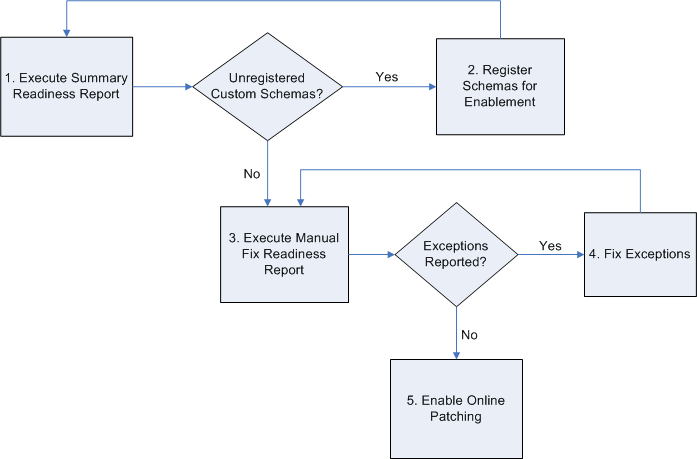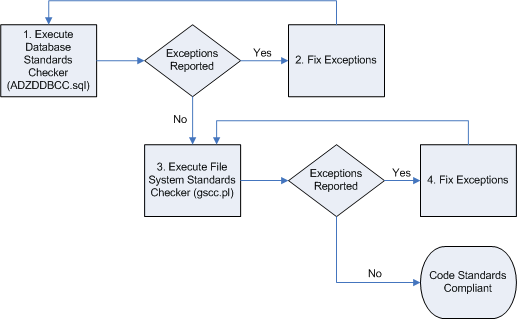Preparing for Online Patching
Introduction
Oracle E-Business Suite includes a utility, the Online Patching Readiness Report, to help you identify database components that need updates in preparation for Release 12.2 and Online Patching enablement. This utility is to be run in a Release 11i, 12.0, 12.1, or 12.2 environment (before Online Patching is enabled).
This utility is available independent of Release 12.2 for customers preparing to upgrade prior to acquiring Release 12.2. It is also available for Release 12.2. Download the appropriate patch for your release (Release 11i, 12.0, 12.1, or 12.2). To find the patch number, refer to My Oracle Support Knowledge Document 1531121.1, "Using the Online Patching Readiness Report in Oracle E-Business Suite Release 12.2." The patch README file has the most up-to-date information on this utility.
Important: You must fix all violations that are reported by this utility before enabling online patching.
Running the Summary Readiness Report and the Manual Fix Readiness Report
You must run the readiness reports described in the sections below from the application tier APPL_TOP. This reports lists objects that do not comply with the edition-based redefinition (EBR) rule that noneditionable objects may not refer to editionable objects (editionable objects are synonyms, views, and PL/SQL objects). This report also lists several naming standard violations that must be fixed prior to applying the online patching enablement patch.
In addition, you must run the Global Standards Compliance Checker (GSCC) script and address errors that are reported by this script. For up-to-date information on this script, refer to My Oracle Support Knowledge Document 1531121.1, "Using the Online Patching Readiness Report in Oracle E-Business Suite Release 12.2," as well as the related patch README file.
The steps involved with running the report are illustrated in the following diagram:
Running the Summary Readiness Report and the Manual Fix Readiness Report

-
Run the Summary Readiness Report (ADZDPSUM.sql).
If there are no unregistered custom schemas, proceed to Step 3. Otherwise, go to Step 2.
-
Register schemas for enablement.
Run the Summary Readiness Report again.
Repeat Steps 1 and 2 until there are no unregistered schemas. Then proceed to Step 3.
-
Run the Manual Fix Readiness Report (ADZDPMAN.sql), the Online Patching Database Compliance Checker, and the Global Standards Compliance Checker.
If there are no exceptions reported, go to Step 5. Otherwise, go to Step 4.
-
Fix any exceptions found by running the utilities in Step 3.
Run the utilities in Step 3 again until there are no exceptions found.
-
Enable Online Patching.
Ensuring Custom Code Complies with New Standards
You must ensure your custom code complies with the new standards that ensure the relevant database objects and code can successfully be patched online.
Use the tools provided to review your customizations for violations of Oracle E-Business Suite Online Patching standards:
-
Database Standards Checker (ADZDDBCC.sql) - This utility scans the data dictionary for objects and code that violate the standards.
-
File system check report (gscc.pl) - This script scans the file system for source files that violate the standards.
The readiness reports described earlier and the Database Standards Checker (also called the Database Compliance Checker, or DBCC) are designed to be run on a system that has not yet been online patching-enabled. They can and should be run after enablement as a final check. The sequence for the procedure after online patching has been enabled is as follows:
-
Upgrade to Release 12.2.
-
Run readiness reports.
-
Fix errors and repeat Step 2.
-
Run the Database Standards Checker (ADZDDBCC.sql).
-
Fix errors found in Step 4. Repeat Step 4.
Note: The DBCC utility cannot give a complete report until the system has online patching enabled.
-
Enable online patching.
-
Rerun readiness reports. No errors or issues should be reported.
-
Rerun the Database Standards Checker (ADZDDBCC.sql).
-
Fix any errors and repeat Step 8 until no errors are reported.
Checking Compliance with the Database Standards Checker

Preparing the Environment
Prepare the environment to run the utilities.
-
Initialize the run file system environment:
source <RUN APPL_TOP>/<Instance SID>_<hostname>.env
Note: The subsequent steps assume that you are running in the same session which was initialized with this environment file. If you need additional operating system level sessions, remember to initialize the environment with this same environment file.
-
Create the online patching log file location and set it as the current directory:
mkdir $LOG_HOME/appl/op cd $LOG_HOME/appl/op
Note: The $LOG_HOME directory will be under the instance top of the run file system.
Running the Readiness Reports
-
ADZDPSUM.sql - Provides a summary of the schemas that will be editioned and the schemas with objects that depend on Oracle E-Business Suite code that are recommended to be editioned. You can register these schemas with the application by running the commands that will be listed in the last section of this report. Oracle recommends that you run this report again after the custom schemas are registered with the application.
Refer to the patch README for instructions on running this script. Review the generated report and perform the recommended actions. Rerun the report until you have no more pending actions.
-
ADZDPMAN.sql - Lists objects with different categories of EBR rule violations; these objects must be fixed prior to running the process enable Online Patching to avoid errors. Oracle recommends that you run this report after all custom schemas are registered with the application according to instructions in the above report ADZDPSUM.sql.
Refer to the patch README for instructions on running this script. Review the generated report and perform the recommended actions. Rerun the report until you have no more pending actions.
-
ADZDPAUT.sql - Lists all the objects with violations to the EBR rules that will be fixed automatically from the enablement process. This report is provided for information purposes and no action should be taken for this report.
Note: Many violations in the readiness report can be automatically fixed by registering your custom schemas. Review the last section of the Summary Readiness Report (ADZDPSUM.sql) for sample commands on how to register your custom schemas, as well as any schema installed as part of an Oracle technology such as APEX, XDB, and OWBSYS. You must register any custom or third-party schema that does not support Oracle E-Business Suite Online Patching. The following schemas should NOT be registered:
-
SYS
-
SYSTEM
-
CTXSYS
Any dependency between these schemas and editioned objects is a coding standards violation and must be fixed manually.
Oracle recommends that you perform the chosen fixes by customizing the template file $AD_TOP/sql/ADZDPCUST.sql. The reports provide more details on this step.
Running the Online Patching Database Standards Checker
Run the Online Patching Database Standards Checker Report (ADZDDBCC.sql) to check for coding standards violations.
This utility reports violations to the Online Patching development standards. Refer to the database object standards in My Oracle Support Knowledge Document 1577661.1, "Developing and Deploying Customizations in Oracle E-Business Suite Release 12.2," for more information. You must fix any object listed in this report that is part of your custom code. If you do not fix the violation, then you cannot use the online patching infrastructure to patch the objects listed in this report.
Note: The consequences of failing to fix a violation depend on the type of violation. Objects that do not comply with Online Patching development standards may behave incorrectly or become invalid during or after online patching.
Note: Some SQL statements in this report have a dependency on Oracle E-Business Suite Release 12.2 which requires the Oracle 11gR2 database or higher. If you are running the report prior to a Release 12.2 upgrade and have not upgraded your database to 11gR2 or higher, then any SQL failures can be ignored. The report should then be rerun after the Oracle E-Business Suite Release 12.2 upgrade is complete or the database has been upgraded to 11gR2 or higher, and any errors corrected then.
Running the Global Standards Compliance Checker (GSCC)
Run the Global Standards Compliance Checker (or GSCC, or gscc.pl script) to check for common standards issues.
The implementation of Online Patching in Oracle E-Business Suite Release 12.2 relies on the Oracle Database Edition-Based Redefinition feature, and adds a new logical view over the database objects in schemas registered with Oracle E-Business Suite. Access to these database objects must be through the logical layer, and new coding standards help to ensure that code does this correctly. The implementation of the logical layer has been done such that the majority of application code already follows the new standards; however, this script is provided to scan and identify many compliance issues if they exist. To learn more about this script, refer to My Oracle Support Knowledge Document 1531121.1, "Using the Online Patching Readiness Report in Oracle E-Business Suite Release 12.2," and the readme for the patch referenced in that document.
The Global Standards Compliance Checker (GSCC) consists of a main engine script $FND_TOP/bin/gscc.pl plus various enforcement code (EFC) modules in $FND_TOP/perl/GSCC/OpenEFC that check for common standards issues. Refer to the readme of the patch for instructions on running the GSCC and interpreting the output. Correct the errors reported by this script.